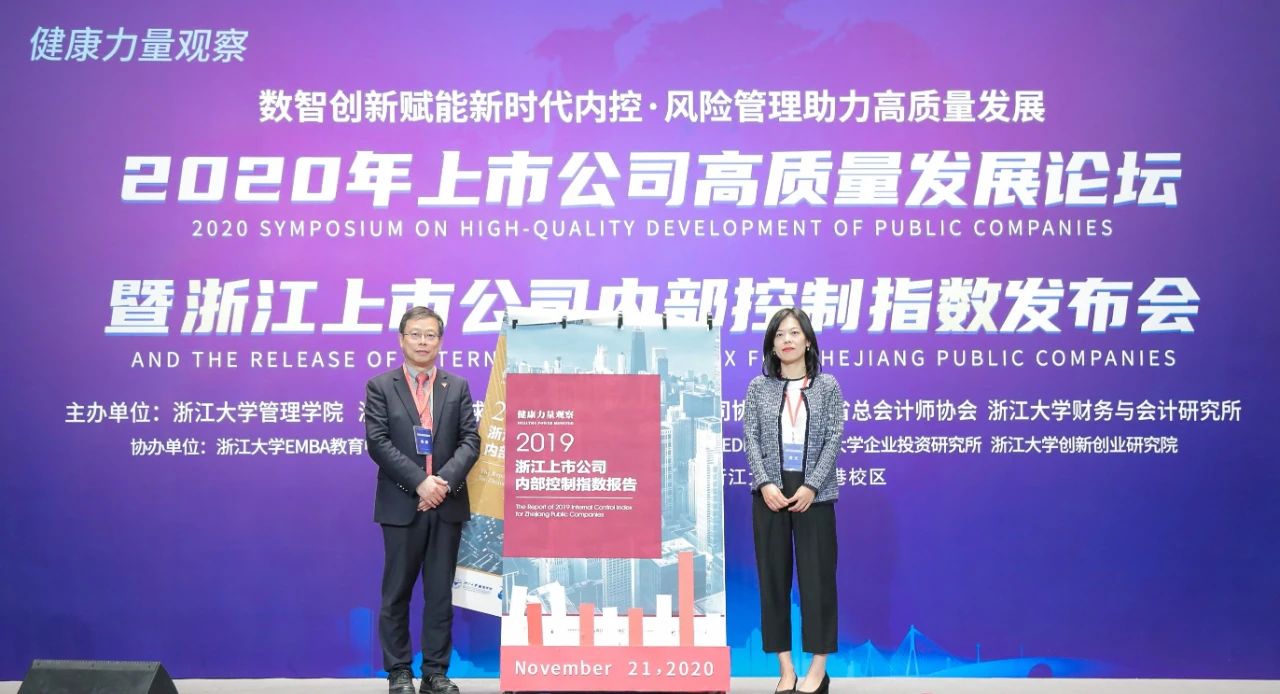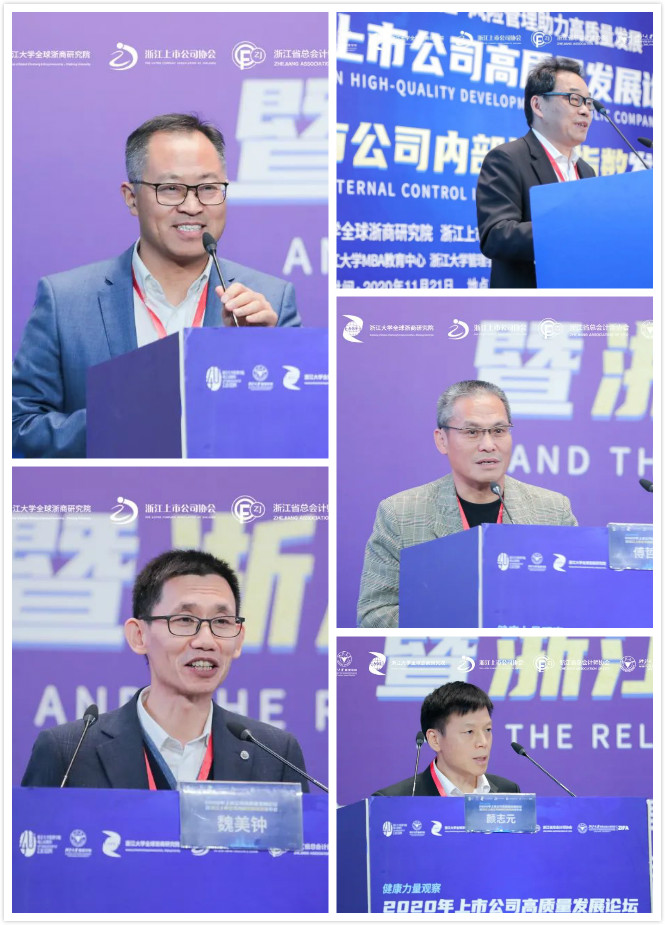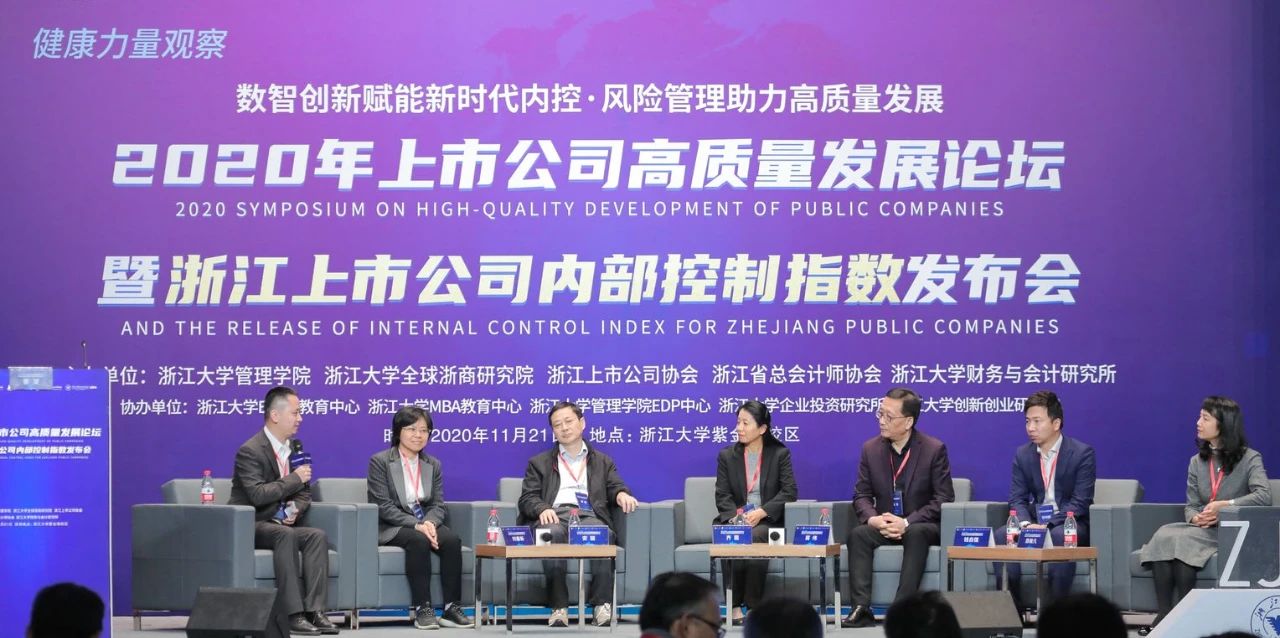On November 21st, 2020, as one of the series of events celebrating the 40th anniversary of School of Management Zhejiang University, the Healthy Power Observation·2020·Symposium on High-quality Development of Public Companies and the Release of Internal Control Index for Zhejiang Public Companies opened grandly, at which, School of Management Zhejiang University, Academy of Global Zheshang Entrepreneurship, Zhejiang University, the Listed Company Association of Zhejiang, Zhejiang Association of CFO, and Institute of Finance and Accounting, Zhejiang University jointly released the 2019 Report on Internal Control Index for Zhejiang Public Companies and announced the list of "Top 30 Internal Control" Zhejiang public companies in 2019. Experts from the political, business, and academic circles, together with representatives of award-winning companies shared their own experience of internal control and risk management with each other, focusing on the ten discoveries and the topic "Digital Intelligence Innovation Empowers Internal Control in the New Era and Risk Management Facilitates High-quality Development". They also discussed how could public companies promote a high-quality development through internal control in the New Era.

YAN Zhiyuan, Director of the Growth Enterprises Market of Shenzhen Stock Exchange, believed that improving the level of corporate governance and accelerating the implementation of internal control system are the bases for promoting the quality of public companies. He also affirmed the work related with internal control index, done by School of Management Zhejiang University and the Listed Company Association of Zhejiang, was very forward-looking, which was of great significance to promote the improvement of the governance level of public companies and to implement the work deployment of the State Council on improving the quality of public companies.
Regarding how to complete the firms internal governance system and to improve the internal governance level, HU Shaoxian, Chairman of Pan-China Certified Public Accountants, proposed that five aspects of work should be focused on: firstly, in terms of purpose and vision, insist on putting social benefits first and unifying the social and economic benefits together, and firmly adhere to the tenet of "contribute to the country and serve the society by professional expertise" ; secondly, in terms of institutional mechanisms, establish an internal decision-making and management mechanism of the firm with clear rights and responsibilities, scientific decision-making, standardized management, and effective operation; thirdly, in terms of quality risk control, shift from an "extensive" development model which emphasizes scale rather than quality to a brand development model that values quality first, and continuously improve quality management and risk control throughout the entire process; fourthly, in terms of talent team, cultivate and form a talent team with a high sense of responsibility, the spirit of dedication and diligence, and with specialized training, good professional ethics, and a reasonable age structure, as well as work well in the selection, employment, development, and retention of talents; and fifthly, in terms of corporate culture, give play to the positive leading role of Party building in shaping corporate culture, guide the majority of practitioners to abide by professional ethics, strengthen self-cultivation, self-discipline and self-improvement, practice professional ethics of integrity, independence, objectivity and fairness, and jointly create a firm culture that can promote the realization of a high-quality development.
FU Zhexiang, the former Deputy Chief Economist of Zhejiang Communications Investment Group Co., Ltd. and former General Manager of the Finance Department of the Group, emphasized that the future control would be "internal and external data linkage + rules + transparency," which would be the challenge faced by any power-oriented internal control.
FU Huaiquan, Secretary-General of Zhejiang Association of CFO, believed that internal control was not just a risk prevention issue, and the fundamental issue should be to improve quality and efficiency. Meanwhile, he also combined the current development trend of the digital economy and shared the progress brought by digitalization and information technology to internal control.
WEI Meizhong, Chairman and CEO, proposed the concept of "digital finance and scenario-based accounting." He believed that in the era of ecological big data, accounting should take steps and directly focus on the scenario data from the original accounting voucher data, and finally realize the real-time accounting and produce real-time data.

Companies that have repeatedly ranked among the Top 30 List also shared their valuable experience and thoughts on internal control. LIU Chunxin, Vice President and Chief Financial Officer of Kuka, said "the biggest difficulty of internal control lies in the creation of an internal control culture and the cultivation of internal control awareness of business personnel, especially in the process of turning private companies into public companies. There are two key measures: one is that internal control must be at the forefront of the business. Finance, including the entire internal control system, must be fully involved from the design of the transaction scenario, and should be solidified through information technology. And the other is "go out", which means both internal control and finance must be the forefront. And the experience in dealing with risks is: first consider the interests of strategic partners, such as the interests of dealers; and second, focus on the main business, strengthen and expand the advantageous industries, and strengthen the strategic confidence among the entire company."
AN Jun, Deputy General Manager of Zhejiang Zheneng Electric Power Co., Ltd., said that "the main difficulty of internal control lies in the balance, which is actually the balance of risks and benefits. We have organized various departments to jointly conduct special analysis to assess the scale of risks and benefits, so that a balance can be achieved between risks and benefits at the end."
Qi Yin, Chairman of the Board of Supervisors of Zhejiang Daily Digital Culture, said that in terms of internal control construction, Zhejiang Daily Digital Culture has been committed to creating an ecological environment for compliance operations, and has formed a "complementary functions and overall linkage" supervision model. First, establish compliance awareness. Second, build the internal control system. Third, regarding the implementation of internal control: be oriented by risk and based on the approval process, and realize the hierarchical management by means of authorization. And fourth, regarding the internal control supervision: form a multi-in-one supervisory force in which all functional departments participate, implement follow-up and comprehensive supervision of key projects, and emphasize interim monitoring."
JIANG Wei, Secretary of the Board of Directors of Ningbo Port, said that "the internal control of Ningbo Port has several characteristics, first is authority and the second is comprehensiveness. The difficulty lies in the control of internal control standards. Because the first link of internal control is self-evaluation, and it is a difficult issue to decide to what extent self-revolution is required. And the third is effectiveness. How to seize business opportunities while not forgetting to do a good job of internal control is the most important thing in the epidemic."
QIAN Ziqiang, Secretary of the Board of Directors of Hailiang Stock Limited Ltd., said that "From the operating perspective, internal control mainly should focus on three biggest risks, namely the raw material price fluctuations, the exchange rate fluctuations, and the accounts receivable. From the management perspective, the most important thing for the effective management of subsidiaries is the internal control system. And in the decision-making during mergers and acquisitions, the most important thing is to achieve a clear strategy and to have a clear company development strategy in advance. In terms of post-merger management, the most important task is the internal control, requiring to establish internal control system based on the characteristics of the merged party, and to grasp internal control in key businesses, which must be both strict and flexible."
CHEN Minfan, Deputy General Manager of the Audit Department of WZ Group, said that "In terms of the construction of the internal control system, at the Group level, WZ Group has basically established a full-covering internal control system network in compliance with requirements for system processing and process informationization. In terms of organizational leadership, the main leaders of the Group are the first responsible persons for internal control; in terms of structure and personnel, the Group has established a complete network. In terms of system, the various systems are relatively complete. In terms of the operation of internal control, first is the daily control and the second is the internal control of major events, requiring to establish a major event reporting mechanism to deal with major events; the third is supervision and inspection, for which, we conduct internal control audits and self-evaluations every year to supervise, implement, and rectify internal control defects; and the fourth is to establish a comprehensive supervision system, strengthen coordination and information sharing between departments, and form a strong supervision force. In terms of digital construction, the main purpose is to improve management intelligence through business digitalization, thereby reshaping business and management, and promoting quality and efficiency and high-quality development. However, our talent construction requires further improvement, including personnel supplement and ability enhancement."

List of Top 30 Internal Control Companies

Appendix: Ten Core Discoveries of the Report
NO.1
There are a total of 11 public companies of Zhejiang that have been listed as the Top 100 Internal Control Companies of the entire country, ranking the third in the country. It is worth noting that this total number only accounts for 2.39% of the total number of public companies in the jurisdiction of Zhejiang, which means the overall level still needs to be improved.
NO.2
CHINT Electrics, Zheneng Electric Power and WZ Group are the Top 3 Internal Control Companies in Zhejiang, and Flat Group, STO. Express, Tigermed, Bull Group and Tonghuashun have been listed as Top 30 Internal Control Companies for the first time.
NO.3
The quality of internal control of public companies in Zhejiang is severely polarized, and the number of high-quality internal control companies is unevenly distributed. Zhejiang should attach importance to the radiation role of benchmarking companies, narrow the polarization gap and improve the overall internal control level of public companies in the province.
NO.4
The five elements of internal control of public companies develop unevenly in Zhejiang Province, among which, the level of “control activities” is the highest and the level of “risk assessment” has been greatly improved, however the “internal environment” is still the weakest and urgently needs to be improved.
NO.5
The average level of internal control quality of public companies in Hangzhou, Wenzhou and Taizhou is among the top three in Zhejiang Province.
NO.6
The internal control quality of transportation, warehousing and postal industry, financial industry, and the electric power, heating power, gas and water production and supply industry rank the first, second and third in Zhejiang Province respectively.
NO.7
Among the 11 prefecture-level cities in Zhejiang, 8 of which have produced companies listed among Top 30.
NO.8
The Top 30 Internal Control Companies of Zhejiang Province are distributed in eight industries, including the manufacturing industry, the transportation, warehousing and postal industry, the wholesale and retail industry, the health and social work industry, the electric power, heating power, gas and water production and supply industry, the culture, sports and entertainment industry, the information transmission, software and information technology service industry and the financial industry.
NO.9
The internal control can facilitate the high-quality development and prevent major risks for the companies.
NO.10
High-quality internal control is conductive to form better solutions for enterprises against the adverse effects brought by the epidemic.